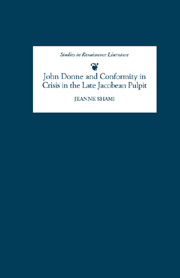Book contents
- Frontmatter
- Contents
- Dedication
- Acknowledgements
- Abbreviations
- 1 “Discreet or religious preachers”: John Donne and the late Jacobean Public Sphere
- 2 “The indiscretion of that foole”: John Knight and the Jacobean Pulpit, 1620–2
- 3 “The fishing of whales”: John Donne's Sermons, 1620–2
- 4 “Faire interpretation”: The Directions and the Crisis of Censorship
- 5 “Wise as Serpents, and innocent as Doves”: Zeal and Discretion in the Pulpit, 1623–5
- 6 “Jesus Wept”: The Journey to Spain and Pulpit Lamentation
- 7 “Blinde buzzards in the choise of a wife”: Sermons and the Moral Marketplace
- 8 “The Lovesick Spouse”: Parliament, Patriots, and the Public Sphere
- 9 “Church-quakes”: Post-Parliamentary Faultlines
- 10 “If the Foundations be Destroyed”: Rules of Engagement
- 11 “Blessed sobriety”: John Donne, the Public Sphere, and Caroline Conformity
- Works Cited
- General Index
- Index to John Donne References
- Index to John Donne's Sermons
- Studies in Renaissance Literature
10 - “If the Foundations be Destroyed”: Rules of Engagement
Published online by Cambridge University Press: 12 September 2012
- Frontmatter
- Contents
- Dedication
- Acknowledgements
- Abbreviations
- 1 “Discreet or religious preachers”: John Donne and the late Jacobean Public Sphere
- 2 “The indiscretion of that foole”: John Knight and the Jacobean Pulpit, 1620–2
- 3 “The fishing of whales”: John Donne's Sermons, 1620–2
- 4 “Faire interpretation”: The Directions and the Crisis of Censorship
- 5 “Wise as Serpents, and innocent as Doves”: Zeal and Discretion in the Pulpit, 1623–5
- 6 “Jesus Wept”: The Journey to Spain and Pulpit Lamentation
- 7 “Blinde buzzards in the choise of a wife”: Sermons and the Moral Marketplace
- 8 “The Lovesick Spouse”: Parliament, Patriots, and the Public Sphere
- 9 “Church-quakes”: Post-Parliamentary Faultlines
- 10 “If the Foundations be Destroyed”: Rules of Engagement
- 11 “Blessed sobriety”: John Donne, the Public Sphere, and Caroline Conformity
- Works Cited
- General Index
- Index to John Donne References
- Index to John Donne's Sermons
- Studies in Renaissance Literature
Summary
THE CRISIS of censorship that had been alleviated by public debate of religious and political issues in parliament resurfaced late in 1624 when negotiations for the French match threatened to delay the second session of parliament indefinitely. In the final weeks of December 1624, King James once again issued proclamations ordering relaxation of penal laws against recusants in anticipation of the marriage between Charles and Henriette Marie of France. This was not the first time James had done so. But, after the outburst of popular relief at the failure of the Spanish match a year before, the penal laws had been tightened up again and attacks on Catholicism had crept back into sermons. In July, Chamberlain had predicted that the French match “is like to stick at the old stumbling blocke of toleration” (II, 571), but by 9 October he reported that “Our papists begin to hold up their heads again” (II, 581–2). The uncertainty resulting from James's new efforts to appease Catholics worried many who felt that this laxity would hinder continued reform in the Church. This fear of idolatry was compounded by the fear of sedition. Penal laws had acted for some time to identify and suppress potential threats to national religious and political security. Now, the security provided by these laws was being compromised for what many saw as political concessions that would drive England even closer to idolatry.
- Type
- Chapter
- Information
- John Donne and Conformity in Crisis in the Late Jacobean Pulpit , pp. 256 - 271Publisher: Boydell & BrewerPrint publication year: 2003



